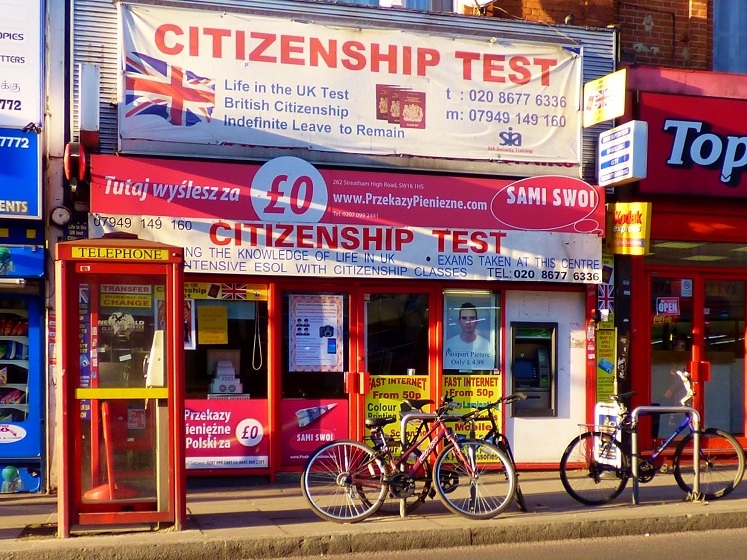 Citizenship Test, Streatham. grassrootsgroundswell, CC BY 2.0
Citizenship Test, Streatham. grassrootsgroundswell, CC BY 2.0
The era of mass migration to Britain began in 1945, as the government encouraged non-natives to come and help rebuild the nation’s economy at the end of the Second World War.
For the remainder of the 20th century, acquiring British citizenship was a relatively straightforward procedure, with new arrivals sometimes processed at their point of entry and then left to pursue their lives.
But around the turn of the century the rules around citizenship for immigrants changed. It was no longer sufficient for applicants to prove their length of residency in Britain or demonstrate their right to live in the country; citizenship was now a privilege that had to be earned through active participation in society.
From 2004, adults who applied for British citizenship were also required to attend a ceremony where they pledged loyalty to the country and its monarch. In 2005, the British government required prospective citizens to take a “Life in the UK” test.
Dr Anna Tuckett of the Department of Anthropology is currently researching the citizenship application process. She says “The test was introduced by the Labour government amid concerns about the supposed failure of multiculturalism and a desire to ensure that the population held shared fundamental principles and values.”
Dr Tuckett found that while the test has acted as a form of gatekeeping since its inception, it was under the Conservative-led coalition, who came to power in 2010, that the test became “particularly exclusionary”.
She says: “The backdrop to these changes was the threat of UK Independence Party (UKIP) taking votes from the Conservatives, prompting then Prime Minister David Cameron to pledge a reduction in immigration.”
Other than a handbook for the 24-question citizenship exam, the government does not provide any official support to these prospective citizens. As a result, a private tuition industry has emerged to help train those seeking to pass.
Dr Tuckett conducted ethnographic research in one of the private teaching centres in north London between 2015 and 2017. Through attending classes, she found that the citizenship test requires those seeking naturalisation to rehearse an antiquated vision of British history, culture and society that is largely irrelevant to their lives.
Dr Tuckett says: “The redesigned test reflected the new government’s desire to appear tough on immigration, and their revisions worked as applications for citizenship fell significantly soon after it was introduced.”
The clearest example of this is the addition of a British history component to the test, with students having to revise specific information from a government set curriculum.
This includes memorising the names of monarchs, historical battles and significant dates, which Dr Tuckett says, “is particularly challenging for those with weaker literacy skills”.
One of the most contentious aspects of the test is how it deals with Britain’s colonial past. Dr Tuckett says: “Britain is portrayed as great and benevolent with the ugly sides of its history, such as slavery and colonialism, omitted from the syllabus.”
“This is very keenly felt in the classes, because the majority of the prospective naturalisation candidates come from Britain’s former colonies,” she adds.
Debates about multiculturalism go to the heart of the citizenship test. In theory, the test celebrates multiculturalism, with tolerance of religious faiths and different ways of life emphasised as key British values.
But the students’ practical experiences of the British state do not reflect this supposed tolerance; for them, the citizenship test is one of many attempts by the state to impede their naturalisation applications.
Dr Tuckett says: “This is one of the handbook’s central contradictions. The official position is one of tolerance towards migrants and the promotion of multiculturalism; yet migrants’ own experiences with immigration bureaucracy and in their everyday lives are quite different."
"Their experiences of racism, prejudice and discrimination are at odds with the supposedly cherished values of tolerance and freedom that characterise the handbook.”
Dr Tuckett is sceptical about whether it is possible to distil a national experience and culture into a single test. “It assumes that society and culture are somehow fixed and static, when society is always in constant flux.”
“The whole exercise mistakenly presumes that those who are required to take this test are not already part of British society. This is despite the fact that many people who attend these classes have lived and worked in the UK for a very long time.”
Rather than promote integration, Dr Tuckett says the test ultimately creates exclusion and division: “Because applicants are forced to learn about a Britain that only acknowledges their contributions in tokenistic form, they are essentially made to feel like second-class citizens.”